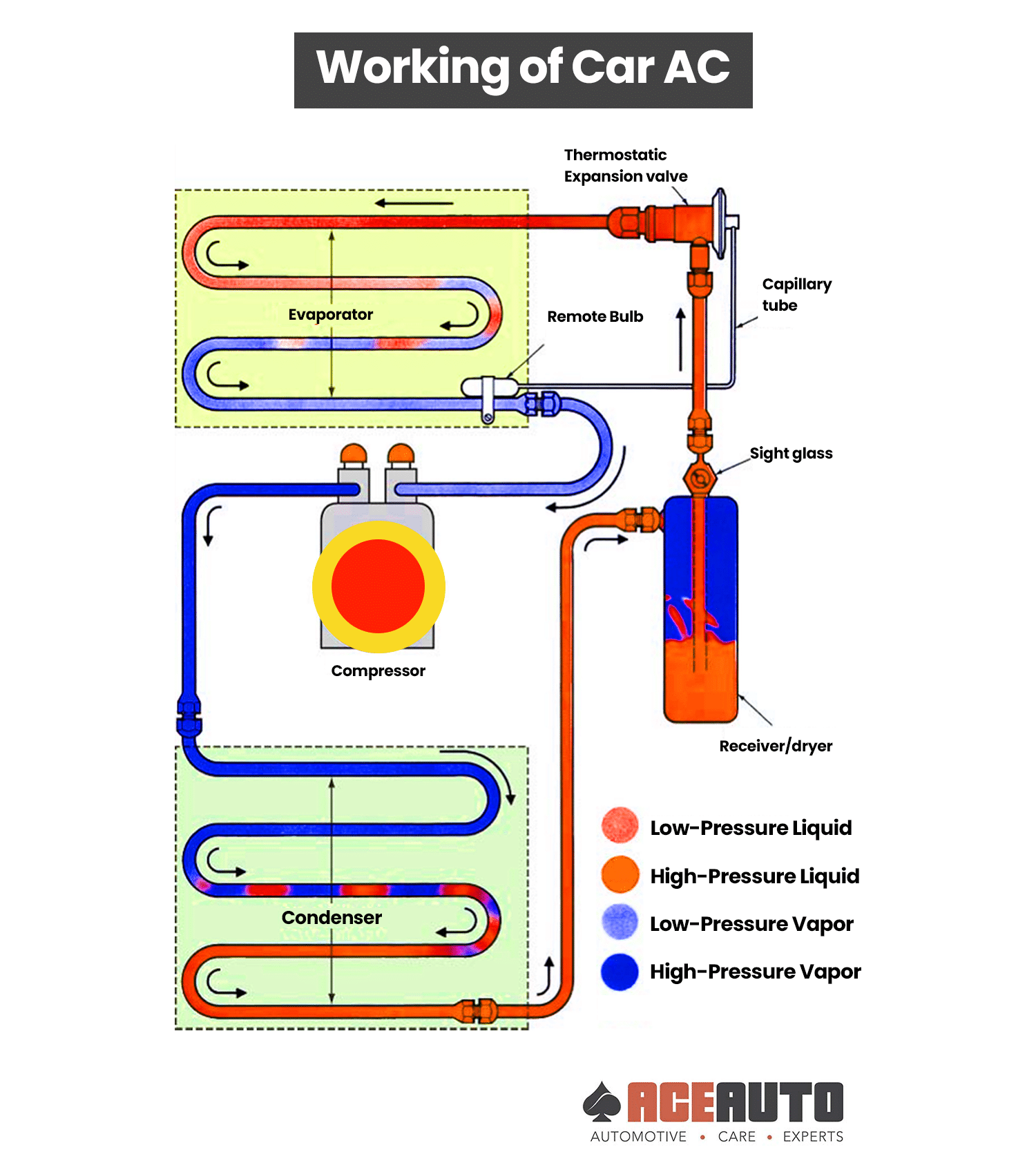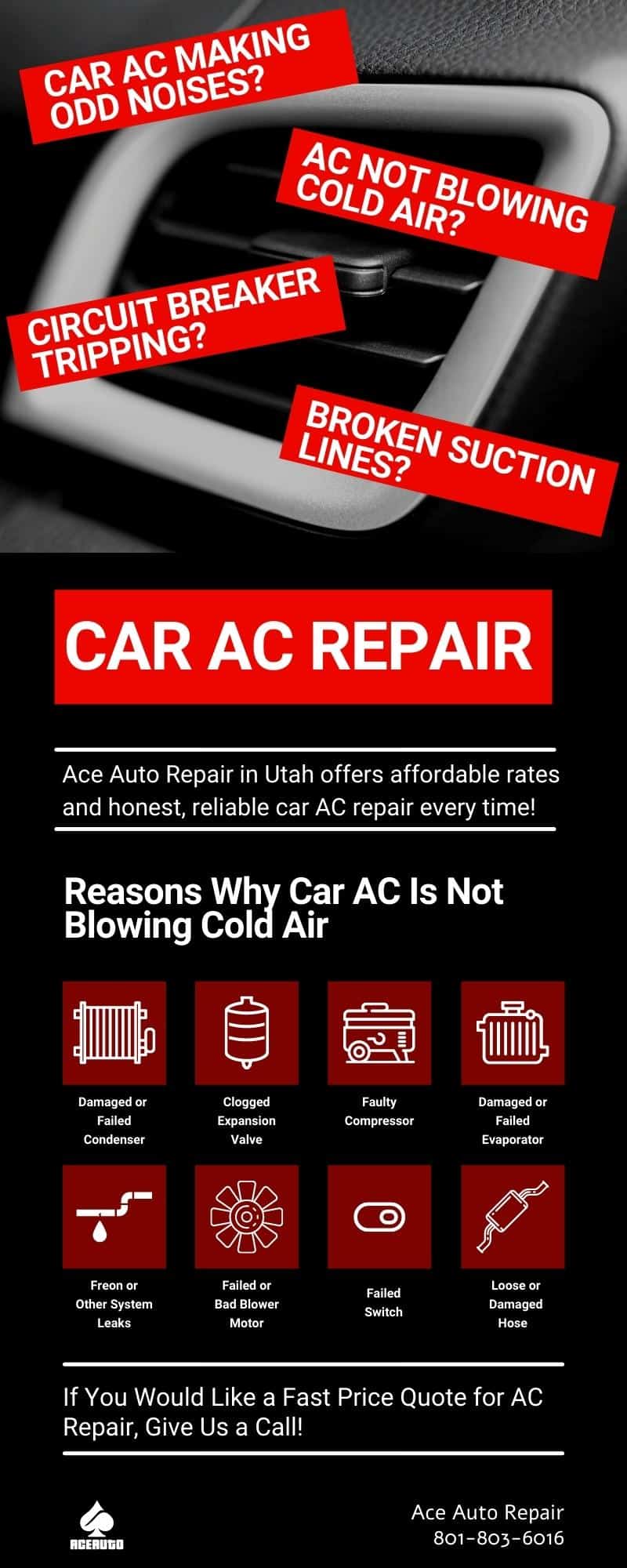
If you're looking for an air conditioner repair company in Utah, then look no further than the experts at Ace Auto Repair. We specialize in car AC repairs and recharge, so if your system is on the fritz or needs to be recharged, we can help!
With more than 25 years of experience in all things related to automotive AC systems, our technicians are ready with their state-of-the-art tools and knowledge to get your vehicle back into its cool comfort zone. You don't need to worry about cost either because we'll always give you a free estimate before any work begins. Contact us today for all of your AC service needs!
Experiencing AC problems with your car? Call Ace Auto Repair in West Jordan, UT, or schedule online today. A qualified technician will be able to help make sure that the problem gets resolved as soon as possible so all of us can feel comfortable again!
Click to jump to section:
Car AC Diagnosis at Ace Auto Repair
Signs Your Car AC Might Not Be Working Properly
Reasons Your Car AC Might Not Be Working Properly
How Does Car Air Conditioner System Work?
Frequently Asked Questions for Car Air Conditioner Repair and Recharge
Contact the Professionals at Ace Auto for Car Air Conditioning Repair
Car AC Diagnosis at Ace Auto Repair in West Jordan, Utah
Your car’s air conditioning system may have a number of reasons why it is not blowing cold air. By catching problems early on, you may be able to prevent small problems from becoming larger. Regular maintenance will keep your AC system operating at peak performance! When you bring your vehicle to Ace Auto Repair, we will perform a comprehensive inspection of your car air conditioning system includes:
- Testing for proper Freon levels
- Testing for Freon contamination
- Checking the system for refrigerant leaks
- Clean condenser
- Inspect AC belts, seals, and hoses for damage
- Examining blower
Signs Your Car AC Might Not Be Working Properly
- No air conditioning - One of the first signs that your car has an issue with its AC system is if you can’t feel hot or cold air coming out when it should.
- Weird noises - Behind a non-functioning air conditioner, the next easiest warning sign to spot is weird noises. Say you turn on your AC and start hearing banging or worse? A quick fix would again call upon professionals’ expertise if something needs fixing ASAP before there's major damage.
- Nasty smells - Third, nasty smells. Turning on your AC shouldn't be an unpleasant experience but sometimes foul odors start coming out of the vents which could mean mold growth in that portion of the air conditioning unit itself.
- Water stains - After running your air conditioning for a while, you will see water drain out. This is normal and indicates that the unit has been doing its job well! But if there's no sign of it draining - or instead just stains inside your vehicle- then something might've gone wrong with this process.
- AC leaks - The fifth and final warning sign is the air conditioning leak. Low pressure in your AC unit can be a sign of an impending leak, as well as coolant draining around your vehicle - even if it doesn't seem like there's anything wrong at first!
If you suspect one of the above signs please get your vehicle checked by us, so that we may diagnose what's going on before more serious complications arise!
Reasons Your Car AC Might Not Be Working Properly
The Refrigerant Needs to Be Recharged
This is the most common reason why your car might not be blowing cold air. There is a refrigerant that is responsible for helping the air conditioner remove heat from the air, ensuring that it blows out cold air. While it is possible for you to recharge your car’s refrigerant on your own, this could take an extended amount of time and you might end up damaging the air conditioner in the process. It is better for you to save time and avoid a larger auto air conditioning repair by trusting a trained professional to recharge your refrigerant quickly.
Leak in the Refrigerant System
Another reason why your car’s air conditioner might not be blowing cold air is that there is a leak in the refrigerant fluid. This might be hard to detect because the fluid instantly evaporates when it comes into contact with the air. This makes it hard to spot; however, a trained professional has specialized equipment that can be used to detect leaks. Some of the signs that the AC might have a leak in its refrigerant include:
- There is a loud click when the air conditioner turns on
- There is oil residue present around the pipe fittings and hoses of the AC system
- There are hissing sounds coming from the system even when the engine isn’t running
- It seems like the air conditioner is cycling between on and off quickly
A refrigerant leak is a serious problem because refrigerant itself is actually toxic. Therefore, it should only be handled using proper equipment in the hands of a trained professional.
Fans Are Failing
If your car’s air conditioner has fans that are failing, this can lead to a lack of cold air as well. Some cars have one fan while others have two. They need to work properly to not only keep you cool but your engine as well. If you think your fans might be broken, then you need to reach out to trained professionals for help with an auto AC repair.
Damaged or Failed Condenser or Car AC Condenser Leak
If you find your car AC not cooling or putting out less cold air than usual, these may be symptoms of a bad AC condenser. Or, leaks in car AC systems can cause these symptoms. Having your car AC not working properly can become a serious problem in hot weather. So, unsurprisingly, many people face replacing car AC condensers that start leaking during the summer. Here’s the simplest explanation of:
- How a car AC condenser works
- How to identify a leak in the AC condenser
- What to do if your AC condenser is leaking
How an AC Condenser Works
Almost all modern automobile AC systems operate with a condenser. The main function of this important component is converting nonliquid refrigerant into a liquid. Here’s how the auto AC condenser works within a car’s air conditioning system:
- When refrigerant passes from the compressor, it enters the condenser in the form of hot vapor.
- As cool air moves through the AC condenser fins, it cools the refrigerant that is passing through.
- This creates condensation, which is the transformation of the vapor into a liquid.
Then, when you turn on your air conditioner, the cold liquid refrigerant is routed to cool the cabin of your car. (This is similar to the way your car’s radiator works.)
Symptoms Car AC Condenser Problems
A professional auto repair technician can identify the cause of your air conditioning problem. But, if your vehicle AC stops cooling or is only cooling very little, here’s how to check car AC condenser functionality, to identify a bad or leaking condenser in your car. Look for:
- Reduced cooling: When a car AC is outputting significantly less cool air than usual, this is a big clue that can help you quickly identify the problem and get it corrected as quickly as possible. Diminished cooling is one of the major symptoms of AC compressor leaks or a bad compressor. A damaged condenser may constrict the flow of the AC refrigerant, causing the whole cooling system to perform less efficiently. This can significantly reduce the amount of cool air your AC system produces.
- Visible Leaks: The clearest of all signs of a car AC condenser leak is leaking that you can actually see. Through years of use, a car AC condenser may start leaking, either due to damage or just the aging of this auto part. The refrigerant in an automotive AC system is under high pressure in the compressor and the condenser. This means, depending on the size and location of the car AC condenser leak, all the refrigerant can be lost. That can disable your vehicle’s entire air conditioning system. So, when you discover a leaking AC condenser in your car, you should have the part replaced promptly.
Car AC Condenser Replacement
All the refrigerant in a car air conditioning system must pass through the condenser for conversion to the cold liquid used to generate cooling in the cabin of your car. This means that if the condenser is leaking, the breach can be expected to negatively impact the output of cool air from the AC system. When that happens, you will need to replace your AC condenser to enjoy a comfortable level of air conditioning in the vehicle.
So, if you are experiencing a loss of cooling due to a car ac condenser leak, have your AC system assessed by a professional technician, and have the part replaced if necessary.
Clogged Expansion Valve
In order to ensure that your AC system continues running smoothly and efficiently, it is important for you to regularly maintain the various parts within. One such part, in particular, is expansion valves which regulate how much refrigerant flows through them by opening or closing. If the expansion valve is stuck open or clogged, the AC system won’t cool properly. A clogged valve leads to the insufficient refrigerant, increasing the pressure in the system and causing the AC compressor to overheat. If the valve is stuck open, too much refrigerant is allowed to pass through the system and into the compressor. If the expansion valve fails, it can cause problems with the functionality and performance of the AC system – and if ignored, it can be expensive, with irreversible damages to other system components.
Additional Reasons Include:
- Faulty Compressor
- Damaged or Failed Evaporator
- Freon Leak
- Leaks in System Seals – Core Case Seals, Blower House Seal &/Or Evaporator Core Case Seals
- Bad Blower Motor
- Failed Switch
- Vacuum Leak
- Hose Came Loose or Damaged
- Failed Blower Motor
How Does AC Work in a Car?
A car air conditioning system is made up of many different components that all work together to produce cold air. One important component is the compressor, which uses refrigerant to cool down the hot engine coolant (or anti-freeze), and then pumps it through an evaporator where it can release some heat. Car AC repair is necessary for any issues with your vehicle's AC system, so make sure you take care of any problems as soon as you notice them!
AC System Refrigerants
Previously, automobile air conditioning systems utilized R-12 as the refrigerant. R-12 (also known as Freon) is a highly effective CFC refrigerant that isn't flammable or poisonous to humans. During the late 1980s, researchers discovered that widespread use of R-12 was damaging the ozone layer in the atmosphere.
In the mid-1990s, manufacturers switched to R-134a. R-134a is an HFC refrigerant (hydrofluorocarbon) that does not have the ozone-depleting qualities of R-12/Freon. The newest refrigerant, R-1234yf, generates fewer greenhouse gases than the previous one.
Car AC System Parts
Automobile air conditioning systems have a few key components. Listed below are the main parts and their roles:
Compressor
- It's the system's power unit that distinguishes the low-pressure side from the high-pressure side.
- Compresses low-pressure gas into high-temperature/high-pressure gas.
- Mounted to the front of the engine and driven by a serpentine belt
Condenser
- It lowers the temperature of refrigerant while maintaining high pressure.
- As the refrigerant cools, it changes from a gas to a liquid state.
- It works similarly to an automobile engine radiator, using forced air (fan or vehicle movement) to transfer heat.
- In front of the vehicle, behind the grill
Dryer
- Removes the water from the refrigerant by using a desiccant (drying agent).
- Has some filtering capabilities that may be applied to a system.
- Between the condenser and metering device, it is mounted on the high-pressure side of the system.
Metering Device
- is either an expansion valve or fixed orifice tube
- Reduces refrigerant pressure, which reduces the temperature of the refrigerant quickly.
- After leaving the metering device, the refrigerant is still in a liquid state.
- Between the dryer and firewall, it is installed on the high-pressure side of the system.
Evaporator
- When the refrigerant in the evaporator reverts to a gas state, it creates a cooling effect.
- When the cabin air enters the evaporator, it is cooled and dried.
- The only component that is mounted inside the passenger compartment, behind the dashboard.

Path and Characteristics of Refrigerant
- The compressor (gas) receives low-temperature/low-pressure refrigerant.
- High-temperature/high-pressure refrigerant leaves the compressor (gas)
- In the condenser, the refrigerant cools and changes to a liquid.
- Still under high pressure
- Receiver/dryer removes water from refrigerant
- Expansion valve reduces refrigerant pressure
- The refrigerant reverts to a gaseous condition in the evaporator.
- Heat is absorbed; when air blows over the evaporator, it is cold and dry.
Frequently Asked Questions for Car Air Conditioner Repair and Recharge in West Jordan, Utah
- Freon is leaking from breech seal, hose, or failed O-ring or other component
- Refrigerant charging hose clogged
- Blower motor resistor not working or fan motor
- Leaking vacuum line
- Evaporator or condenser damaged or not working
- Refrigerant needs to be recharged
- Expansion tube clogged
- Compressor clutch or compressor failed
- Failed fuse, control, switch, relay, solenoid, or other part broken
- Leaks in seals or other A/C components due moisture or damage
- Blown fuse stopping power to some parts of the A/C system
- Clogged expansion valve preventing refrigerant flow to the evaporator
- Bad compressor clutch causing incorrect pressure in the compressor
What is “Black Death?”
This mechanical problem spreads like a disease through your car’s A/C system. Black Death starts with the breaking down of refrigerant in your air conditioner compressor. The refrigerant serves to lubricate the system, not unlike the way motor oil lubricates the engine. When the refrigerant decomposes, the loss of this lubricant leads to friction in the compressor, which leads to rapid and severe wearing.The wearing causes sharp metal particles covered with the grime of the disintegrated refrigerant to circulate through and damage the entire air conditioning system. Soon, the A/C system quits generating cold air and ultimately may produce no airflow at all.
- Loose blower hose (duct)
- Open blower housing seals
- Burned out ventilation fan
- Open evaporator core case seals
When moisture becomes mixed with the A/C refrigerant, it can produce an acid that is corrosive to the parts of the air conditioning system. For example, parts that are designed to remove moisture from the car A/C system, such as the accumulator or drier, can become damaged by moisture in the system and will no longer function after a leak occurs that exposes the A/C system.
Have questions about your car’s air conditioner in West Jordan UT? Call Ace Auto today for a free repair quote!

Schedule your Air Conditioner Performance Check today!
Contact the Professionals at Ace Auto for Car Air Conditioning Repair
If your vehicle’s air conditioning system is not up to par, Ace Auto Utah is here to help. We service all types of cars, trucks, vans, and RVs. To have your air conditioning system recharged, repaired, or replaced by experts consider Ace Auto Repair in West Jordan, Utah. We are dedicated to giving our customers the absolute best service value available for the vehicles we work on. We stand behind all work that we do with and all work is guaranteed. Make an appointment with our trained professionals today for a car AC repair!



 Ace Auto Repair
Ace Auto Repair